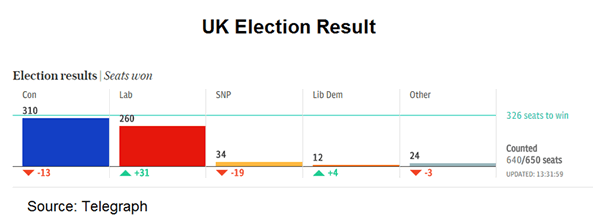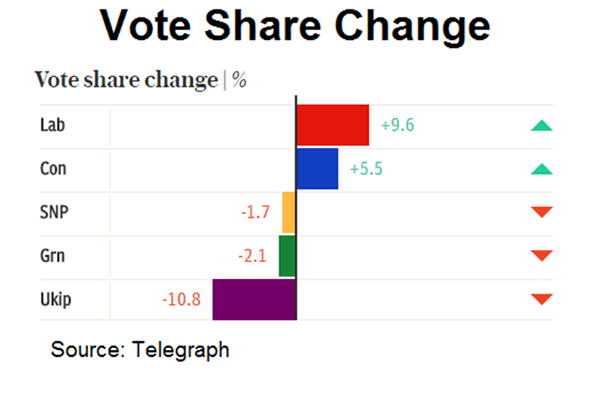With 98% of the vote declared, PM Theresa May’s Conservative Party would remain the biggest party with over 300 seats in the Parliament. However, Tories would highly likely fall short of majority. The disastrous scenario in our previous report materializes: A hung parliament is now inevitable. Yet, unlike the situation in 2010, Tories would find it very challenging to form a coalition government with other parties. The snap election not only has resulted a reduction in number of seats for Tories, but also has scrapped their majority status in the Parliament. This would only make the Brexit negotiation with the EU more difficult, even if Tories managed to form a coalition government.


So far, Conservatives have got 310 seats, down -13 seats from previously, while Labors gained +31 seats to 260 The result for the Scottish National Party (SNP) was also shocking as the party only retain 34 of the 53 seats it held previously. Liberal Democrats gained +5 seats more to 12 but its ex-leader and UK’s former Deputy Prime Minister Nick Clegg lost his seat to the Labour Party in Sheffield Hallam. The party’s former leader Ming Campbell confirmed that it would make "no pact, no deal, no coalition" with either Labour or the Conservatives in case of a hung parliament. The SNP and DUP (10 seats) would likely be king-makers in a hung parliament.
It now remains uncertain which parties would come up with a coalition government. The increasing uncertainty does not bode well for sentiment in the near- to medium- term. Even if Tories eventually managed to form a minority government with other parties, there are louder voices demanding Theresa May to resign. On Brexit negations, domestic noise over the issue would inevitably be louder than before. Undoubtedly, the election result has deteriorated UK’s bargaining power in Brexit negotiation. Meanwhile, there have been rising speculations over another Brexit referendum. Additionally, the rise of Labour’s might be perceived as negative by some investors, as Jeremy Corbyn, the party leader, has proposed to re-nationalize industries, increase business and personal taxation and raise government spending. The overhang would remain over the coming few months, at least.
